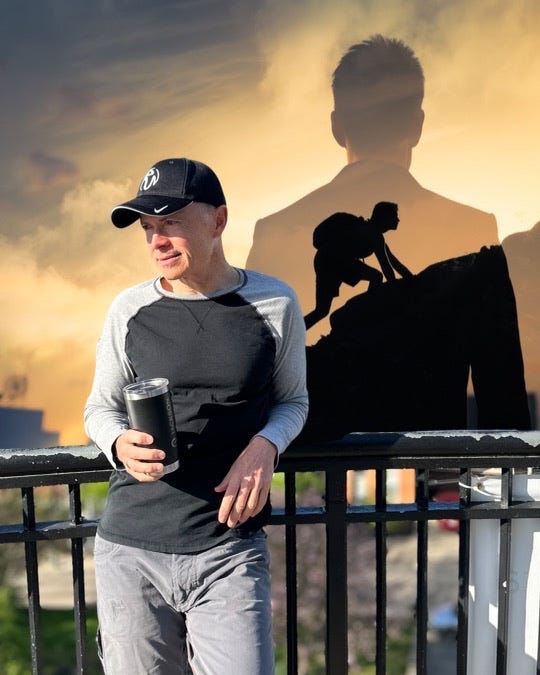Dear Why Team Member,
I hope your Best Year Ever is off to a great start! To Become More in ‘24, this week we consider one of the most significant Why questions we humans can ask:
Why do we do what we do?
While this question has been addressed in thousands of writings, over thousands of years, revealing both conscious and unconscious thought, think Pavlov's dog for example, a workable answer is simply:
Because we think what we think.
Consider someone’s behavior in which you disagree, is it possible that if you thought their thoughts, that you too might do what they do? As the saying goes, “if you had walked a mile in their shoes?!”
"Life as we know it" is a personal experience. Life can only be as we know it and what we all think to be true or untrue about life is deeply personal. Because we humans can strongly identify who we are with our thoughts, someone’s disagreement with our thoughts can feel like rejection.
Byron Katie, author of “Loving What Is” shares an insight worth contemplation:
“Defense is the first act of war”.
Consider those who are offended by the thoughts of another. No matter the other’s intention, the one who believes they have been offended may very well be the first to attack. Without a desire to understand another and in turn more deeply understand ourselves, we can become deeply involved in arguments with little to no positive outcomes.
Remember, those who are most comfortable with their beliefs do not demand others to believe the same.
In the movie "A few Good Men", Tom Cruise says to Jack Nicholson, “I want the truth”, to which Jack responded, “you can’t handle the truth”.
Why is the truth so hard for us humans to handle? Could the truth end our life as we know it? Yes, it could, if any part of our life is not based on the truth. This can be a very painful journey - and no doubt why many people become afraid of the truth.
Deep within the human brain is found the amygdala, responsible for human fear and rage, which knows only fight, flight, and freeze. While fear in the present tense is invaluable, anticipatory fear is not. My good friend and coach, Dr. Roger Hall has been of tremendous assistance to me over the years. His insights on the amygdala have answered many of my Why questions. Apparently, the amygdala does not know the difference between death, rejection, or failure. As herd creatures, rejection from the herd means death and if we fail enough, death will likely come sooner. Even the fear of public speaking is the fear of death; the public speaker is separated from the herd.
To become more in ‘24, consider more the teachings of Epictetus, Marcus Aurelius, Victor Frankle, Admiral Stockdale, and Albert Ellis - all who have provided priceless insight for the peace that best comes from the inside out. [Most of which you’ll find on my list of most often recommended books here]
Albert Ellis, the father of CBT, Cognitive Behavioral Therapy, provides us a formula that illuminates why we do what we do:
A + B = C
Try this on for size:
Adversity + our Belief about it = our Consequence / Life Experience
Without careful examination we can come to believe that only our external circumstances determine our well-being. Wow, externally dependent, co-dependent, now that's a formula for fear and an extra desire for control!
Those who are externally dependent for peace have little of it.
Imagine, however, being at peace no matter the external circumstances. The ones who achieve it, surely have more peace and joy in their lives. True power is found in the "B" for Belief; change your thoughts, change your life. But this is easier said than done. Since our current experience of life is as we know it, any part of our life based on something that is not true, must die for us to live more fully and freely in the truth - thus signing us up for the end of our life - as we "know it".
Resisting reality is futile, it will eventually catch up to us; however, changing our thoughts and expectations to align with reality brings freedom. I am convinced that if you are emotionally suffering in any way, you are likely resisting what is, resisting what is happening around you and likely missing the learning from the journey that is for you. And it all makes sense - because, for something new to get in, something old must get out. Change, in all its forms, reminds us of the end, ultimately the end of our physical life - and physical death is the core human fear. Maybe this is why those who no longer fear death, are the ones who most enjoy life.
So here is some Rocket Fuel Thinking to Become More in ‘24:
It is written in the ancient text to count it All as Joy; not count some of it as Joy or most of it as Joy, but rather ALL of it as Joy. Also notice that the teaching is to count it all as Joy, not to count it all as Happiness. Happiness is externally dependent; something from the outside must happen to experience happiness. Happiness is "A" dependent in the A+B=C formula; happiness is dependent on the external. Just look at the focus on happiness in our country today. Where you find great abundance, you typically find a sense of entitlement. The belief is that if we can change the outside, we don't have to look on the inside.
Few people ask for character building experiences, but we receive them none the less. And when we do, we have a choice, to believe we have been cursed or that we have been blessed, to believe that we are a victim or have received the opportunity to become a victor. The difference is in how WE CHOOSE to think about what happens.
Yes, it hurts when life does not give us what we want, but with the courage to believe that we may just be receiving what we need, because of our struggles, we become more than we were before.
Fear not the cocoon that ends the life of the caterpillar, but rather focus on the gift that brings the butterfly. The end of your life as you know it, may just be the gift you need to Become More in 2024!
Count it all as Joy and no doubt you will make it a great week,
Steve Luckenbach






